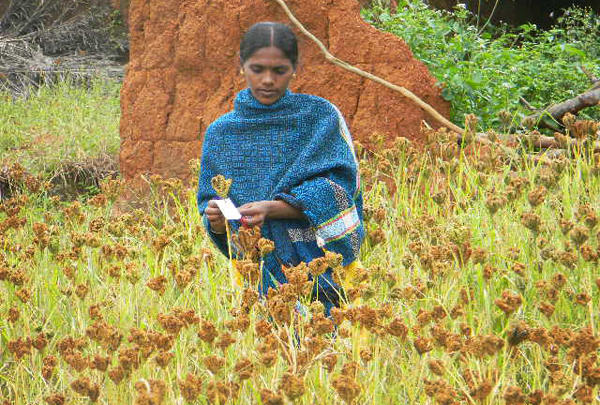Underutilized crops to enhance resilience and nutrition in Mali, India and Guatemala

A new research initiative aims to enhance the resilience of livelihoods and improve nutrition in Mali, India and Guatemala through the use of neglected and underutilized species such as fonio, kodo millet and chaya spinach.
Soil deterioration, farmer debt, diminishing taste and quality of food, and the thinning of our biodiversity safety net, are just a few reasons why the Green Revolution model of high-input production of uniform modern varieties is no longer a viable solution for agricultural development. Demand is growing for a new model that embraces the nutritional and cultural values of food and preserves the agricultural biodiversity needed to help us adapt to an ever changing world.
Bioversity International is making big steps with its research on neglected and underutilized species, developing a holistic approach to strengthen the resilience of agricultural livelihoods. A new initiative to promote nutritious and hardy traditional crops was launched in Rome this April, taking forward lessons learned over the last 15 years working on Andean grains in Latin America and minor millets in South Asia.
The new initiative will be implemented in Mali, Guatemala and India, working with partners such as The Indigenous Partnership for Agrobiodiversity and Food Sovereignty, who will bring expertise on engaging with indigenous peoples – some of the most important custodians of agricultural biodiversity and also among the most vulnerable to climate change.
While the target crops will be finalized in national stakeholder meetings in June, they will likely include fonio (Digitaria) in Mali and kodo millet (Paspalum scrobiculatum) in India. A greater cultivation and use of these climate-smart crops is expected to strengthen the resilience of food systems in these countries, which are challenged by dwindling and more unpredictable rains.
“This project is based on the genuine needs of the people and the times,” expressed Ashis Mondal from Action for Social Advancement, who will be coordinating the work in India. “The project has significant value in the context of India, as a large section of its population still depends on the production and productivity of millets and other so-called minor crops”.
While the value of hardy staples under climate change is clear, Bioversity International nutrition expert Gina Kennedy, suggested that attention should also be given to underutilized legumes, fruits or vegetables to promote more balanced diets. The highly nutritious spinach tree or chaya (Cnidoscolus acutinofolius), was mentioned as a potential target crop for Guatemala, as it outperforms ‘real’ spinach in its content of iron, vitamin C, calcium, potassium and other nutrients.
Promoting nutritionally-dense crops and working with more than one value chain at a time, were just some of the insights gained during debates and discussions at the project launch conference. Quinoa, was often referred to as a case where the popularization of an underutilized species led to problems of soil exhaustion, diversity loss and price increases that made the crop unaffordable for the poor.
How to avoid these pitfalls and maximize sustainability benefits from promoting traditional crops were issues explored with experts from different fields and organizations over the three-day conference. The methodological framework is being refined for the project through a multi-stakeholder consultative process that will also involve representatives from target communities.
Using a participatory and interdisciplinary process is a major feature of the project, and will build the capacity of farmers, researchers and government actors to integrate nutrition, resilience and income considerations in the development of more sustainable farm and livelihood systems.
“It’s been a great, exciting and enriching experience to work in this new project because it is bringing opportunity to work with scientists from so many different countries and institutions,” mentioned Silvana Maselli from Universidad del Valle del Guatemala, who will be leading the implementation in Guatemala.
The coordinator for Mali, Amadou Sidibe from L’Institut d’Economie Rurale, also emphasized the value of capacity development for his country, noting that training farmers and strengthening ties between on-farm and ex situ conservation systems are aspects of great importance.
Find out more about the project and the launch conference on the Neglected and Underutilized Species Community website.
You can also contact global project coordinator Stefano Padulosi or Gennifer Meldrum.
This research is supported by the International Fund for Agricultural Development (IFAD), the European Union and the CGIAR Research Program on Climate Change, Agriculture and Food Security (CCAFS).
